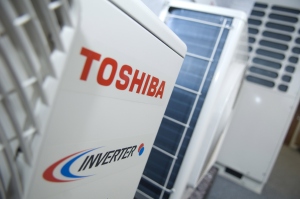R22 users move into borrowed time

The phase-out of R22 in the EU has been a long time coming. The date should be in the diary of every facilities manager, building owner and contractor, and plans should be laid to ensure continuity of cooling for affected buildings, says David Dunn of Toshiba Air Conditioning.
One of the most popular refrigerant gases used in air conditioning finally hits the buffers at the end of this year. From midnight on 31 December 2014, it will become illegal to use reclaimed R22 refrigerant, along with other reclaimed HCFC refrigerants, for servicing and topping up equipment.
Implementation of the ban represents the completion of a long process of ever-tightening restrictions, designed to reduce the use of ozone-depleting refrigerants across Europe. It follows the ban on the use of new R22 for servicing equipment, introduced at the beginning of 2010.
The ban on using reclaimed R22 has major implications for those still reliant on the gas, as well as contractors responsible for servicing affected plant.
Reclaimed R22 will no longer be available to purchase from suppliers, and any stored reclaimed R22 may not be used to service plant. This leaves those with R22 plant facing some pressing choices.
A significant number of systems across the UK still operate on R22 refrigerant. Just how many is hard to determine, but estimates range from 100 000 up to as many as 500 000. The actual figure probably lies somewhere in between the two.
The most exposed in terms of air-conditioning equipment are commercial offices, healthcare, hospitality, pharmaceuticals and data processing. There is also believed to be a significant amount of refrigeration plant still running on R22, used in chillers, cold stores and process coolers.
It is important to note that end users can legally continue to operate equipment containing R22 beyond the end of this year. If a system is operational, gas-tight and not subject to leaks, there is no obligation to remove the R22.
 |
| A sight destined to vanish from the EU — R22 cylinders. |
However, it will be illegal to carry out maintenance or servicing that involves breaking into an R22 refrigerant circuit. This is to prevent accidental release of HCFCs to the atmosphere. If and when it becomes necessary to top up a system, or break into a circuit, the R22 refrigerant must be replaced with a non-ozone-depleting alternative. This may or may not be possible or advisable, depending on the nature of the plant, its age and cost considerations.
Contractors should be advising their end-user customers affected about the implications for equipment and the options to deal with the change.
Depending on the age and suitability of equipment, it may be worth retrofitting to operate equipment on one of the non-ozone-depleting alternatives. A number of these are available, and suppliers will be able to advise on suitability.
If equipment is older, retrofitting may be harder to justify on economic grounds. In this case, it may be necessary to consider replacing equipment. In applications with business-critical cooling requirements, this may be the preferred option in any case, to ensure continuity of service for people or industrial production.
While replacing equipment may at first sight seem the more costly option, capital costs may be offset by the often very significant improvements in energy efficiency that can be achieved by the use of modern equipment. Servicing and maintenance costs are also likely to be lower on new plant.
Taking these factors into consideration may often sway the calculation in favour of fitting new systems, particularly if existing equipment has limited working life remaining.
In assessing whether to replace equipment, a further consideration comes into play in relation to its adequacy for current needs. Due to changes in building use over time, existing plant may no longer be adequate to fully meet current cooling and heating requirements. Replacing equipment, therefore, offers an opportunity to increase capacity to meet the changed requirements, resulting in more comfortable and productive occupants.
 |
| The equipment that will replace system still using R22 is much more efficient and has lower servicing and maintenance costs. |
Due to the lead time on retrofit and replacement projects, it is important that work is planned well in advance. Once the precise nature and scale of the issues on a particular site are understood, an action plan can be drawn up — to include an evaluation of the options available and the anticipated costs.
Budgets can then be allocated and work planned to complete before a crisis arises that could result in loss of service for a building.
The next challenge for the industry on the refrigerants front is of course the coming phase-down of the use of HFCs with high global-warming potentials (GWP). The changes are being introduced as part of the EU’s revision of the F-Gas Regulation.
One of the most important effects is likely to be a move away from the use of R410A, a refrigerant currently widely used in air conditioning, ironically as a replacement for R22 systems.
Although R410A is a safe and efficient fluid, its GWP value means that it is caught in the new phase-down programme. Timescales for implementation of the F-Gas changes are relatively long, and it will be several years before the measure begins to bite.
In the meantime, a range of alternatives are currently being evaluated by the leading manufacturers. It may be a while before a consensus emerges on the industry’s preferred long-term solution.
David Dunn is general manager of Toshiba Air Conditioning.








